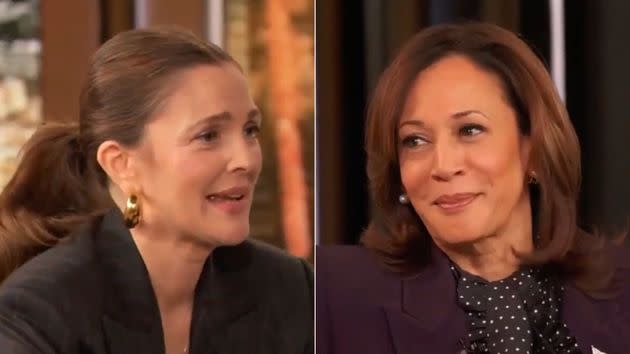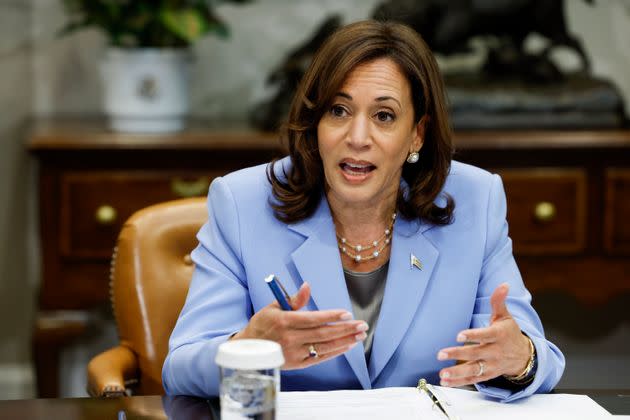Drew Barrymore’s Interview With Kamala Harris Shows How Even Well-Meaning White People Can Be Cringey

On Monday, Vice President Kamala Harris sat down with Drew Barrymore for an interview that’s been called “both extremely uncomfortable and hilarious at the same time” and the “cringiest thing you’ll see this week.” (We’d propose all month, but hey, we’re splitting hairs here.)
The descent into awkwardness began when Barrymore asked Harris about her blended family experiences. Harris has two adult stepkids, Cole and Ella, through her marriage to Doug Emhoff. In 2019, when she was running for president and likely trying to soften her “top cop” prosecutor image, Harris wrote an essay in Elle about Cole and Ella and how they liked to call her “Momala.”
Knowing about the nickname,Barrymore segued into an incredibly uncomfortable tangent.
“I keep thinking in my head that we all need a mom,” Barrymore told Harris, whose body language communicated nothing so much as, “Oh God, where is this going?”
With a tremble in her voice, Barrymore pressed on.
“I’ve been thinking that we really all need a tremendous hug in the world right now,” she said. “But in our country, we need you to be Momala of the country.”
The audience clapped at the corniness while Harris grinned and nodded along, saying, “Yeah, I mean, yeah, no, I know.”
I have been cackling at this for the last 10 minutes pic.twitter.com/kH8qnYNaOM
— Some Movie Guy (@weekend3warrior) April 30, 2024
If Harris was a little taken aback, it’s not hard to see why. It’s tough to imagine a scenario where President Joe Biden, or, to use a more exact parallel, former Vice President Mike Pence, would be asked if he could “be the daddy” of our country.
But it’s also not surprising that Barrymore went there. The former child star is a notorious close talker and a big-time hugger on her daytime talk show. When her guests are truly engaged with her, her emotionality works in her favor. (As a talkshow host, she can be wonderfully vulnerable and empathetic, as we’ve written about before.)
However, when she ignores her guest’s body language, the awkwardness is almost unbearable. (For further proof, see her viral interview with Oprah Winfrey last year, where Winfrey was visibly annoyed by the host’s touchy-feely ways.)
As the Harris clip went viral, a secondary conversation broke out on X, formerly called Twitter, with writer and cultural critic Michael Harriot posting, “Every Black person has been in this position, stuck with a well-meaning white person who SWORE they was spittin.”
In the replies, people shared comical anecdotes about mostly well-meaning co-workers and acquaintances trying to connect by using “hip” slang or loudly proclaiming themselves an ally.
[My youth pastor] said, 'It's hip hop. Do it for your people.'James Jefferson from Kansas City, Missouri
James Jefferson from Kansas City, Missouri, had a particularly good anecdote.
Jefferson said he distinctly remembered a moment in 1990 when a youth pastor asked him to perform a rap she wrote for a church program. Aware that the song was awful and also busy with school work, Jefferson, then 17, politely told her “no.”
“She then tells me, ‘This part is perfect for you. It’s hip-hop. Do it for your people,’” he told HuffPost.
“I was shocked but not surprised by the statement,” he continued. “I flat-out told her that doing this silly rap song does nothing to enhance or lift up my people. She backtracked a bit, then asked me to look it over and think about it.”
Even though Barrymore meant well, her comment to Harris ― delivered in a way that suggested she believed she’d pulled off something poignant ― reminded Jefferson of that youth pastor.
“It triggered me. I can’t lie,” he said. “You have to be aware of the implications of certain statements and gestures, especially when you are in front of a worldwide audience. Respecting others includes respecting their culture, gender and religion.”

Watching the Barrymore clip, journalist and executive producer Andrea Morehead was reminded of how routinely Black women are called everything but their first names in professional settings.
“I had a white male colleague back in 1999 who’d always said, ‘Hey sister,’ with the hard ‘R’ whenever he greeted me,” she said. “It grated my soul.”
Morehead said she was young, naive and willing to tolerate the guy for a while. Eventually, though, she grew tired of it and told him, “I’m not your sister. Please use my name or a simple, ‘How are you doing?’”
“My feeling is, if you’re not singing the song ‘Sister Christian’ by Night Ranger to me, don’t call me sister,” Morehead joked to HuffPost. “But he was always using colloquialisms when speaking with BIPOC, so it was a thang for him.”
As diversity, equity and inclusion programs come under legal attack in schools and workplaces, Morehead has a feeling these awkward scenarios will keep cropping up.
“I think it’s white people’s responsibility to have the desire and curious compassion to seek knowledge and do their work to do better and be better — and put their back into it,” she said.

Black women are tired of having to ‘mother’ people
Others heard echoes of the Black mammy trope in what Barrymore said, with one person writing on X, “Asking the first Black women VP to serve the mammy trope for America’s comfort is ASININE.”
Princella D. Smith, an author and former political operative in Nashville, Tennessee, was struck by that, too.
“Since the slave era, the Black woman’s worth has been tied to what she can ‘do’ for others as in a ‘service,’ and as we can see from our own professional experiences and from this clip, there is literally not a Black woman immune from it,” she told HuffPost.
“We have to be someone’s mama, servant or sexual object,” she continued. “We aren’t judged by talent, work or ability. It’s, ‘What can you do for me?’ And further, if something is going awry, they run to the Black woman to fix it ― and give her none of the credit, by the way.”
Jerica Lowman, a photographer who lives in California’s Bay Area, thinks this “Momala” conversation is similar to how Black women online get called “auntie” because they’re seen as “wise” or mature.
When coming from a stranger, calling someone “Momala” or “auntie” is weird and inappropriately intimate, Lowman said.
“It can definitely be a term of endearment, but people were recently calling the influencer Jackie Aina ‘auntie’ and she finally just rejected it,” she said.
“She’s 36, and her followers are very close to her age. Why are they calling her auntie? It’s not her role to be an example for people,” Lowman continued. “If you admire her, that’s fine, but don’t put her on a pedestal she didn’t even ask to be on.”
Jackie Aina wants people to stop calling her Aunty. She just wants to enjoy her youth.
People of all ages been calling her Aunty for a long time and she’s ready for a new phase in her life. pic.twitter.com/5VzPovs3Xj— Jelly Santos (@MrsJellySantos) March 29, 2024
Of course, a Black woman can be powerful and motherly. Just look at Michelle Obama, who was known as the “hugger in chief” for her affinity for hugging White House guests, said Candace Howze, a multimedia artist in North Carolina.
But there are notable differences between Obama and Harris.
“One of the many roles of the first lady is hostess, so greeting guests warmly is literally part of the job,” Howze said. “I think that viewing VP Harris as ‘Momala’ to the nation can undermine her authority ― not because motherhood lacks power, but because a family nickname inspires more sentimentality than esteem.”
Ultimately, Howze thinks Barrymore’s comment is an unfortunate example of intent versus impact being in total misalignment.
Having seen Barrymore’s show before, Dami Akinnusi Rock, a filmmaker and creative consultant, said she thinks the host was just being her usual “unfiltered Gen X” self.
“[Barrymore] is amplifying our voices and recognizing the humanity in our experiences ― I do think that’s what she was attempting to do,” she added. “I think we can give each other a little grace as we undo so much conditioning.”
Still, Rock said, “My initial reaction was to laugh and cringe, and it felt like Kamala was doing the same. Drew was leaning in, and Kamala was leaning back, looking like she was containing her laughter and probably wondering what was going on.”
My initial reaction was to laugh and cringe, and it felt like Kamala was doing the same.Dami Akinnusi Rock, a filmmaker and creative consultant
As a Black woman, Rock said she’s often been ascribed superhuman qualities: unwavering strength, resilience and the ability to take on everything, including the emotional labor others won’t do.
She’s even found herself playing into the “strong Black woman” stereotype at times. She finds the whole concept fascinating; it’s even the subject of a documentary she’s working on right now, titled “Black Women Can’t Cry.”
“The problem with all this is that these tropes and microagressions can affect our mental health,” she said. “Rather than reinforcing stereotypes or expecting us to carry the weight of the world, I invite white women to continue advocating for us while also remembering our humanity.”
How to connect more authentically across racial lines
Connecting with someone isn’t about knowing the latest slang or referencing a meme popular among Black people. There are always ways to connect more authentically than that.
If you overstepped a boundary ― maybe you’ve “othered” someone or made them feel like they had to be the de facto representative for all Black people ― listen to them if they bring it up. Rather than getting defensive, take their feelings and perspective to heart, Rock said.
“If you haven’t been able to resonate with my lived experience, then of course you would believe your good intentions are enough,” she said. “It’s OK not to know what to do. You don’t have to have all of the answers, and some will be mad at that, but actively listening is an action and is a good strategy.”
That said, don’t depend on your Black friends to teach you what’s borderline offensive.
“There’s a plethora of anti-racism books to learn what not to do or say,” Morehead said. “Although some of them and other Black-centric books are banned in Florida, there’s no excuse for white people, or anyone for that matter, to claim ignorance because ‘I didn’t know’ or ‘no one told me.’”
If a white person sincerely wants to connect with a Black person or any person of color, don’t try to relate to them by fixating on their particular color or culture, Jefferson said.
“You’ve got to find a common interest that you both can relate to, just like you would another white person,” he said. “Anything else is insulting, patronizing and often comes off bigoted and tone deaf.”

 Yahoo Lifestyle
Yahoo Lifestyle 